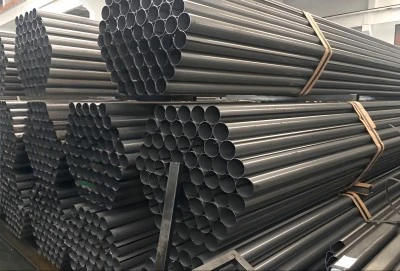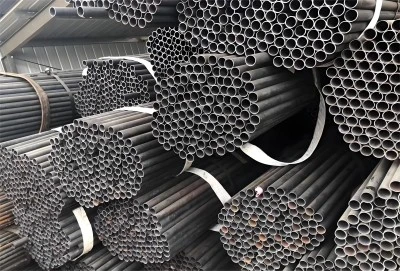In the world of industrial piping, ERW carbon steel pipes have become a cornerstone for numerous applications. These versatile pipes offer a unique combination of strength, durability, and cost-effectiveness that makes them ideal for various structural and fluid transport needs.
|
|
|
What is ERW Carbon Steel Pipe?
ERW, which stands for Electric Resistance Welded, is a manufacturing process used to create high-quality steel pipes. Carbon steel pipes produced through this method are known for their uniform structure and reliable performance. The ERW process involves forming steel sheets or strips into a tubular shape and then welding the seam using electrical resistance heating.
The carbon content in these pipes typically ranges from 0.05% to 0.3%, striking a balance between strength and formability. This composition allows ERW carbon steel pipes to maintain excellent mechanical properties while remaining relatively easy to work with during installation and fabrication processes.
One of the key advantages of ERW carbon steel pipes is their consistency in terms of wall thickness and diameter. The precision of the electric welding process ensures that these pipes meet strict tolerances, making them suitable for applications where exact dimensions are crucial.
Moreover, ERW carbon steel pipes undergo rigorous quality control measures, including non-destructive testing methods like ultrasonic inspection, to ensure the integrity of the welded seam. This results in a final product that boasts exceptional reliability and safety standards.
Why is ERW Carbon Steel Pipe Ideal for Structural and Fluid Transport?
ERW carbon steel pipes have gained widespread popularity in both structural applications and fluid transport systems due to their unique combination of properties. Let's explore why these pipes are considered ideal for such diverse uses:
1. Excellent Strength-to-Weight Ratio: ERW carbon steel pipes offer impressive strength without excessive weight. This makes them perfect for structural applications where load-bearing capacity is crucial, but overall weight must be minimized. In fluid transport systems, this property allows for the construction of extensive pipeline networks without putting undue stress on supporting structures.
2. Cost-Effectiveness: Compared to other materials like stainless steel or specialized alloys, carbon steel is relatively inexpensive. The ERW manufacturing process further enhances cost-effectiveness by allowing for high-volume production with minimal material waste. This makes ERW carbon pipes an economically viable choice for large-scale projects.
3. Versatility: ERW carbon steel pipes can be manufactured in a wide range of sizes and wall thicknesses. This versatility allows them to meet the specific requirements of various applications, from small-diameter pipes used in residential plumbing to large-diameter pipes employed in industrial settings.
4. Weldability and Formability: The carbon content in these pipes is carefully controlled to ensure excellent weldability. This characteristic is crucial for both on-site installations and prefabrication processes. Additionally, carbon steel pipes can be easily formed, bent, and shaped to fit complex piping layouts without compromising their structural integrity.
5. Corrosion Resistance: While not as inherently corrosion-resistant as some other materials, ERW carbon pipes can be treated with various coatings or linings to enhance their resistance to corrosive environments. This adaptability makes them suitable for a wide range of fluid transport applications, including those involving mildly corrosive substances.
6. Thermal Conductivity: Carbon steel has good thermal conductivity properties, making carbon pipes an excellent choice for applications involving heat transfer. This characteristic is particularly valuable in industrial processes where temperature control is critical.
7. Magnetic Properties: Unlike some other pipe materials, carbon steel is ferromagnetic. This property can be advantageous in certain applications, such as in the use of magnetic flow meters or in situations where pipe detection is necessary.
These combined properties make ERW carbon steel pipes a versatile and reliable choice for both structural support and fluid conveyance across various industries.
Strength and Performance of ERW Carbon Steel Pipes
The strength and performance characteristics of ERW carbon steel pipes are key factors in their widespread adoption across various industries. Let's delve into the specifics of what makes these pipes stand out in terms of mechanical properties and overall performance:
1. Tensile Strength: ERW carbon steel pipes typically exhibit high tensile strength, ranging from 330 MPa to over 500 MPa, depending on the specific grade of steel used. This high tensile strength allows the pipes to withstand significant internal pressures and external loads without failure.
2. Yield Strength: The yield strength is generally between 200 MPa and 350 MPa. This property is crucial as it determines the point at which the pipe will begin to deform plastically under stress. The high yield strength of these pipes ensures they maintain their shape and integrity under normal operating conditions.
3. Ductility: Despite their high strength, ERW carbon steel pipes maintain good ductility. This allows them to deform to some extent without immediate failure, providing a safety margin in applications where unexpected stresses may occur.
4. Impact Resistance: ERW carbon pipes demonstrate good impact resistance, especially at room temperature. This property is vital for applications where the pipes may be subject to sudden impacts or vibrations.
5. Fatigue Resistance: The ERW process creates a uniform structure along the pipe, contributing to good fatigue resistance. This is particularly important in applications where the pipes are subject to cyclic loading or pressure fluctuations.
6. Pressure Ratings: ERW carbon steel pipes can be manufactured to meet various pressure ratings, typically ranging from 150 psi to over 3000 psi. This wide range allows for their use in both low-pressure and high-pressure fluid transport systems.
7. Temperature Performance: These pipes can generally operate effectively in temperatures ranging from -20°C to 350°C, depending on the specific grade of steel and the application requirements. This wide temperature range contributes to their versatility across different industries.
8. Dimensional Stability: The ERW process allows for tight control over pipe dimensions. This results in pipes with consistent wall thickness and diameter, which is crucial for maintaining performance characteristics across long pipe runs.
9. Weld Seam Integrity: Modern ERW techniques produce weld seams that are nearly as strong as the base metal. Advanced quality control measures, including ultrasonic testing, ensure the integrity of these seams, contributing to the overall strength and reliability of the pipe.
10. Long-Term Performance: When properly installed and maintained, carbon steel pipes can have a service life of several decades. This longevity, combined with their relatively low initial cost, makes them a cost-effective choice for many long-term infrastructure projects.
It's important to note that while ERW carbon steel pipes offer excellent strength and performance characteristics, their suitability for specific applications should always be verified. Factors such as the specific operating environment, fluid properties, and regulatory requirements must be considered when selecting pipe materials.
High-Quality ERW Carbon Steel Pipes
For those seeking high-quality ERW carbon steel pipes for their projects, it's crucial to partner with experienced manufacturers who understand the nuances of different industrial applications. Longma Group has stood out as one of China's leading ERW/LSAW steel pipe manufacturers since 2003. With a specialization in large-diameter, thick-walled, double-sided, sub-arc-seam welding steel pipes, including LSAW (Longitudinal Submerged Arc Welded) and ERW steel pipes, Longma Group has established itself as a reliable supplier in the industry. By the end of 2023, the company's annual output exceeded an impressive 1,000,000 tons, demonstrating its capacity to meet large-scale industrial demands.
For more information about carbon steel pipes and how they can benefit your specific application, don't hesitate to reach out to the experts at Longma Group. Their team of professionals can provide tailored advice and solutions to meet your piping needs. Contact them at info@longma-group.com to discuss your requirements and explore how their extensive range of steel pipe products can support your next project.














